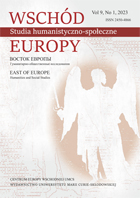Динаміка розгортання деліберативих практик моделювання процесу відновлення України
The dynamics of deployment of deliberative practices of modeling the recovery process of Ukraine
Author(s): Natalia RotarSubject(s): Peace and Conflict Studies, Russian Aggression against Ukraine, Russian war against Ukraine
Published by: Wydawnictwo Naukowe Uniwersytetu Marii Curie-Sklodowskiej
Keywords: Russian aggression; restoration of Ukraine; deliberative democracy; deliberation; subjects of deliberation; consensus;
Summary/Abstract: The article studies the deliberative process, the subject field of which was formed around the problem of overcoming the devastating consequences inflicted on all areas of the functioning of Ukrainian society by the Russian aggressor, who launched a large-scale armed aggression against a sovereign democratic state in February 2022. It is established that today a system of markers of effective deliberation has been formed, the result of which could be the potential development of a consolidated, agreed, systematized vision of the update and a step-by-step plan for its implementation. It has been proved that an institutionalized space of deliberation of recovery of Ukraine was formed, structurally represented by the level of the national plane of deliberation and the level of the international plane of deliberation, which are in constant communication interaction, which is ensured by the normative principles of their functioning. It is substantiated that within the framework of the institutionalized space of the URC, a circle of active subjects (the Ukrainian state, the European Union, the World Bank, international organizations, partner states) and a circle of potential subjects (public organizations, private business, cities and regions of the European Union) of deliberation of the principles of Ukraine’s recovery. In the process of deliberation, there was a consolidation of the positions of the participants in this process in terms of determining the timing of the start of recovery, which should begin under martial law and russia's aggression against Ukraine, but a number of positions were formulated regarding the stages and their essence. Each of the parties to the process of deliberation adheres to its own position regarding leadership in this process. According to the official position of the EU, a recovery of this magnitude, taking place on the European continent, needs EU leadership, implemented in cooperation with international partners. The Lugano Declaration, which is the result of the first round of deliberation, determined that the recovery process is led and directed by Ukraine. At the same time, GMF experts note that the leadership core of managing the recovery process of Ukraine should be formed by the G7 countries, which, together with Ukraine will appoint a powerful coordinator – the United States, explaining their position by the lack of necessary political and financial resources in the EU. It has been established that the basic consensus decisions in the process of deliberation of recovery of Ukraine relate to the obligations of the subjects of deliberation, reflected in the Lugano Declaration and the relevant guidelines: partnership; focus on reform; transparency, accountability and the rule of law; democratic participation; involvement of all stakeholders; gender equality and inclusion; sustainable development. The consensus reached is also important that the reconstruction process does not take priority over the reform process, the fight against corruption, ensuring the transparency of the exercise of power and the creation of an independent judiciary, since two processes are interconnected.
Journal: Wschód Europy. Studia humanistyczno-społeczne
- Issue Year: 9/2023
- Issue No: 1
- Page Range: 11-35
- Page Count: 25
- Language: Ukrainian

